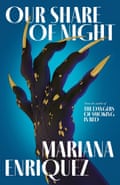A quarter of the books longlisted for this year’s International Booker prize for translated fiction were by South American authors. This proportion was reflected in the shortlist, announced earlier this week, too, with books by Argentinian poet Selva Almada and Brazilian writer Itamar Vieira Junior making the six-strong list.
Announcing its longlist last month, the prize declared a second “Latin American boom”. The first boom refers to the 1960s and 70s, when authors such as Gabriel García Márquez, Julio Cortázar, Carlos Fuentes and Mario Vargas Llosa were widely translated, igniting an international love affair with the innovative literature emerging from the region.
That first boom is known in particular for popularising the magical realism genre. Blending indigenous folklore with the surrealist movement pioneered by André Breton, magical realism was a response to the political instability that rocked Latin American countries during the cold war era. “Surrealism comes from the reality of Latin America,” García Márquez once said. His modern classic One Hundred Years of Solitude traces the history of the fictional Colombian town of Macondo and its founding family, addressing the continent’s struggles with colonialism, dictatorships and political unrest.
A line can clearly be drawn between this literary style and today’s boom: modern writers are similarly infusing realism with the supernatural, telling stories of the marginalised that criticise the powerful. But where the original Latin American boom was male-dominated, women are at the vanguard of this new literary generation, moving away from tired stereotypes involving dictatorships and narco-trafficking, or mixing genres to approach these subjects in inventive ways. Writers such as Mariana Enríquez, Samanta Schweblin, Fernanda Melchor, Mónica Ojeda and Agustina Bazterrica use horror and speculative fiction to engage with femicide, trauma and violence against women. “There’s a danger to their writing, something menacing,” says Julia Sanches, a literary translator who translates from Portuguese, Spanish and Catalan into English.

In Enríquez’s Our Share of the Night, an exploitative elite secretly communes with the dead during Argentina’s military dictatorship. In Samanta Schweblin’s Fever Dream, psychological horror is used to critique agricultural chemical companies, while in her short stories the uncanny pervades everyday domesticity to unnerving effect. Such books have found a ready audience in Britain – Enríquez has sold more than 60,000 copies across the three novels she has had published in the UK. The UK has meanwhile hosted its own revival of gothic fantasy and folklore, with books by authors such as Daisy Johnson.
Sophie Hughes, who has translated Latin Americans including Fernanda Melchor, Brenda Navarro and Alia Trabucco Zerán, suggests that the second boom is not only spearheaded by women, but also by women translating women. A new generation of female translators relish the linguistic and stylistic challenges that come with experimentation and are instrumental in bringing books by South American women to agents and publishers.

Selva Almada’s International Booker shortlisted Not a River, translated by Annie McDermott, uses language so particular to her rural upbringing in the Argentinian province of Entre Ríos that even people from Buenos Aires joke about needing to read her with a dictionary. In fact, dictionaries don’t always include her vocabulary, McDermott writes in her translator’s note.
“When I first started, people were looking for the next Roberto Bolaño, the next epic masculine voice” says Megan McDowell, translator of breakout Argentinians Enríquez and Schweblin. “And now there’s a lot more openness to other voices that are feminine, non-binary, from outside the major cities, or from smaller indigenous languages. I think the reading public and thus the editorial world has become more inclusive, and it’s not a politically correct thing, it’s what people genuinely want to read.”
Just as Han Kang’s The Vegetarian expanded the market for Korean fiction, the popularity of these writers has paved the way for their peers, although Julia Sanches says that unlike that instance, the only Latin American government that has funded literary translation is Argentina – and that has recently been cut off.
after newsletter promotion
As in the 1960s and 70s, this surge of interest in Latin American authors is not just specific to the UK. “It’s a worldwide phenomenon,” says Laurence Laluyaux, literary agent at Rogers Coleridge and White. “It’s actually happening in almost every European country, and in other parts of the world.” Laluyaux’s clients include Alia Trabucco Zerán, whose second novel Clean, exploring domestic servitude in Chile, recently became a number 1 bestseller in Sweden and will be published in the UK in June. English translations open up further markets, as more editors worldwide read English. Boosted by prizes such as the International Booker and America’s National Book Awards, translated literature has recently grown in popularity in the UK, particularly among readers under 35. And, according to a 2023 Booker Prize Foundation report, Spanish is the seventh most popular original language for translated fiction in this country, with 124,000 books sold in 2022.
Despite arts council cuts affecting grants and small publishers, there is optimism that this second boom will continue, thanks to the launch of new translation-focused press Foundry Editions and the growth of Latin American specialist Charco Press. Charco founder Carolina Orloff hopes the market will keep broadening, with voices from less-translated countries such as Peru and Bolivia breaking through. “I think there’ll be growth,” she says. The International Booker is “sparking conversations and curiosity, and hopefully we’ll see more Latin American authors being published not just by us, but in general in the UK.”
-
To explore all the books on the shortlist for the International Booker prize 2024, visit guardianbookshop.com. Delivery charges may apply.
